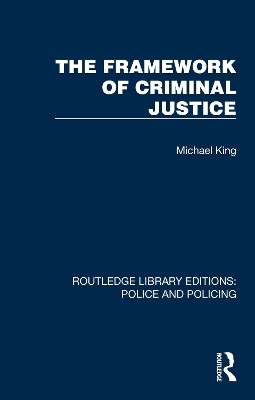
The Framework of Criminal Justice
Routledge (Verlag)
978-1-032-42166-7 (ISBN)
In The Framework of Criminal Justice, originally published in 1981, the criminal justice process is analysed by using six models, each of which expresses a different justification for criminal justice and punishment: the due process model – exacting justice between equal parties; the crime control model – punishing wrong and preventing further crime; the bureaucratic model – controlling crime and criminals; the medical model – rehabilitating offenders; the status passage model – publicly denouncing the crime and criminal; and the power model – maintaining domination by the ruling class and reinforcing class values. The study examines the formal rules and procedures of the magistrate court system within the context of these models and also discusses the roles of the actors (police, defendant, magistrate, court clerks, and lawyers). Next, the study depicts eight scenes that occur from the defendant's arrest through a court hearing to sentencing. It assesses how closely the activity and behaviour within the system follow the formal protections granted by the British system of justice, and it concludes that the process is far more complex and the rules far more open to interpretation than is commonly believed. The book suggests that this miscalculation has led to the failure of various reforms – special attention is given to the Bail Reform Act of 1976 and two sections of the Criminal Law Act of 1977. It further suggests that real reform must depend upon an understanding of the political nature of the criminal justice system.
Michael King is now an Emeritus Professor of the Law School, University of Reading. In this, his first book, he brings together his experiences while acting as a solicitor in magistrates' courts around London and the West Midlands in the 1970s with his study of social theory undertaken for a Master's dissertation at Warwick University. Since its publication, he has written many books and articles mainly about children and society's efforts to protect them from harm and promote their welfare. In recent years his academic work has concentrated on expounding, applying and translating the works of the acclaimed social theorist, Niklas Luhmann.
New Preface for Reissue. Acknowledgements. 1. Understanding the Criminal Justice Process 2. Theoretical Approaches to Criminal Justice 3. The Formal Process 4. Scenes in the Criminal Justice Process 5. Making Sense of the System 6. Getting the System Right: The Process of Law Reform 7. Bibliography. Index.
| Erscheinungsdatum | 10.03.2023 |
|---|---|
| Reihe/Serie | Routledge Library Editions: Police and Policing |
| Verlagsort | London |
| Sprache | englisch |
| Maße | 138 x 216 mm |
| Gewicht | 490 g |
| Themenwelt | Geschichte ► Teilgebiete der Geschichte ► Militärgeschichte |
| Recht / Steuern ► EU / Internationales Recht | |
| Recht / Steuern ► Rechtsgeschichte | |
| Recht / Steuern ► Strafrecht ► Kriminologie | |
| Recht / Steuern ► Strafrecht ► Strafverfahrensrecht | |
| Sozialwissenschaften ► Soziologie | |
| ISBN-10 | 1-032-42166-5 / 1032421665 |
| ISBN-13 | 978-1-032-42166-7 / 9781032421667 |
| Zustand | Neuware |
| Haben Sie eine Frage zum Produkt? |
aus dem Bereich


